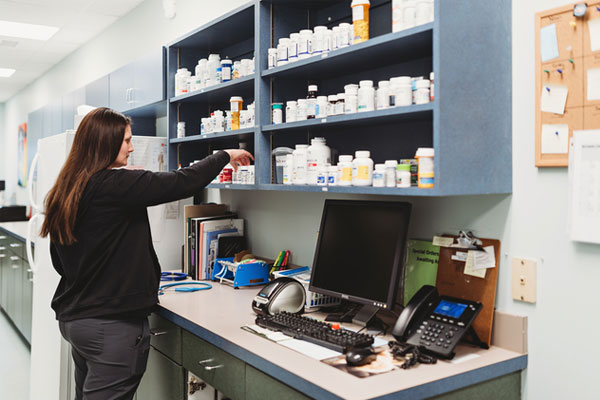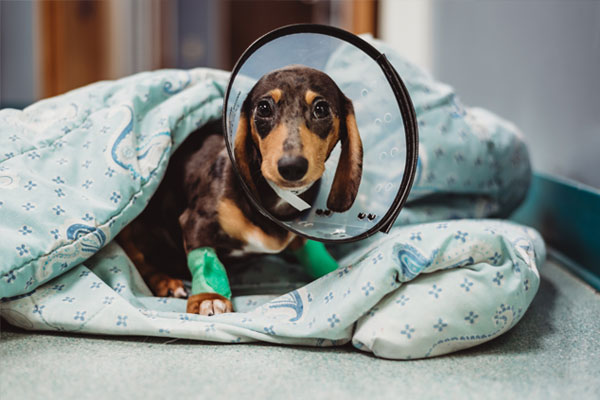Wellness and Preventative Care

At Countryside, we know you want your pet to enjoy the longest healthiest life possible! For
that reason, we are strongly focused on wellness and preventative medicine. So many diseases and problems can be avoided or minimized with vaccination, screening, preventative measure, and early detection and treatment.
The foundation for healthy cats and dogs involves regular comprehensive veterinary exams including diet evaluation and dental evaluation, appropriate vaccination, wellness bloodwork screening, appropriately timed spay and neuter procedures, parasite screening, parasite prevention, and dental care when needed. From your pet’s infancy to his or her senior years, we’ll assess the proper preventive care based on your pet’s lifestyle and individual circumstances and tailor their preventative and medical care to their needs.
Call our hospital today to find out how to start your pet down the road to the best health possible!
What to Expect at Your Pet’s Annual Exam
POCKET PETS
Annual exams are also recommended for your pocket pets. While most pocket pets do not require vaccinations, with the exception of ferrets, they should be weighed and examined for possible problems. Pocket pets can sometimes have very specific care needs. We are a resource for that information—and for all your pet care needs.
The foundation for healthy cats and dogs involves regular comprehensive veterinary exams including diet evaluation and dental evaluation, appropriate vaccination, wellness bloodwork screening, appropriately timed spay and neuter procedures, parasite screening, parasite prevention, and dental care when needed. From your pet’s infancy to his or her senior years, we’ll assess the proper preventive care based on your pet’s lifestyle and individual circumstances and tailor their preventative and medical care to their needs.
Call our hospital today to find out how to start your pet down the road to the best health possible!
What to Expect at Your Pet’s Annual Exam
- A thorough physical exam from head to tail (eyes, ears, mouth, teeth, skin, heart, lungs, abdomen, weight, joints, feet, muscles, lumps/bumps, etc.)
- Intestinal parasite and heartworm screens and complete parasite prevention recommendations
- Vaccine updates appropriate for your pet’s needs
- Diet evaluate and recommendation
- Other tests that may be indicated (blood work, skin or ear cytology, urinalysis, etc.)
- A detailed plan for any further diagnostics or procedures your pet needs
POCKET PETS
Annual exams are also recommended for your pocket pets. While most pocket pets do not require vaccinations, with the exception of ferrets, they should be weighed and examined for possible problems. Pocket pets can sometimes have very specific care needs. We are a resource for that information—and for all your pet care needs.
Surgery

Countryside Veterinary Hospital is equipped to handle both routine and more complex
surgical procedures. Every patient is thoroughly evaluated and their surgery protocol selected based on their individual needs. Exceptional skill, dedication, and solid pre- and post-operative protocols ensure the best possible outcome for our patients. We also offer laser surgery, which has many benefits over conventional scalpel surgery.
COMMONLY PERFORMED ANIMAL SURGERIES INCLUDE:
We are also skilled in orthopedic procedures, which is an area of special interest at our hospital.
Surgeries are scheduled and performed Monday through Friday. Drop-off time is between 7 to 8 a.m.. Pick-up for outpatient procedures is generally between 4 and 5 p.m. If your pet is showing clear signs of illness (runny nose, fever, etc.) or the blood work reveals problems, we will reschedule or re-evaluate your pet for surgery.
- Pre-surgical evaluation-- We thoroughly examine your pet and verify that he or she is healthy enough for surgery. We require all pets over 8 years of age to have blood work; and highly recommend it for all pets. Bloodwork can be run in our lab the morning before a procedure.
- Careful selection of anesthetics and sedatives—Continuous monitoring and short acting, anxiety easing sedatives are utilized as a complement to our inhalant anesthetics. Medication protocols are tailored to each patient.
- Pain management—We provide pain relief before, during, and after surgery.
- Post-operative stays—We offer the option of staying overnight for some surgical patients and may require it for more invasive procedures.
COMMONLY PERFORMED ANIMAL SURGERIES INCLUDE:
- Spay and neuter procedures
- Declawing
- Mass and tumor removal
- Dental cleaningsand procedures
- Eye surgery
- Wound and laceration care
- Foreign body removal
- Amputations
- Emergency care(during office hours)
We are also skilled in orthopedic procedures, which is an area of special interest at our hospital.
Surgeries are scheduled and performed Monday through Friday. Drop-off time is between 7 to 8 a.m.. Pick-up for outpatient procedures is generally between 4 and 5 p.m. If your pet is showing clear signs of illness (runny nose, fever, etc.) or the blood work reveals problems, we will reschedule or re-evaluate your pet for surgery.
Dental Care

“Doggy Breath” is not normal! It is the sign of dental disease! Oral health is one of the biggest keys to overall health
in our pets. Every cat or dog over the age of 1 year has some level of periodontal disease. However, many owners are unaware of the problems lurking in their pet’s mouths, and how detrimental they can be to their health and wellbeing.
Untreated dental disease can lead to pain, gum loss, tooth loss, bone infection, and seeding the body with bacteria which can lead to systemic infections, heart problems, kidney problems, and liver problems. Serious oral problems can stop a pet from eating. To prevent these unfortunate outcomes, we have a very strong focus on dental health at Countryside Veterinary Hospital. We evaluate, recommend and provide these services when needed for each pet:
Call today to schedule your pet’s oral exam!
If your pet requires advanced dental care (root canals, pulpectomies, bonding, etc.), we will refer you to The Pet Hospital of Madison.
Untreated dental disease can lead to pain, gum loss, tooth loss, bone infection, and seeding the body with bacteria which can lead to systemic infections, heart problems, kidney problems, and liver problems. Serious oral problems can stop a pet from eating. To prevent these unfortunate outcomes, we have a very strong focus on dental health at Countryside Veterinary Hospital. We evaluate, recommend and provide these services when needed for each pet:
- Basic oral health exams
- Preventive at-home pet dental care instruction
- Full mouth dental x-ray to evaluate for trouble beneath the gum line
- Professional cleaning
- Extractions of damaged or unhealthy teeth
Call today to schedule your pet’s oral exam!
If your pet requires advanced dental care (root canals, pulpectomies, bonding, etc.), we will refer you to The Pet Hospital of Madison.
In House Lab and Store

We have a full store to provide the medications your pet’s need conveniently and efficiently.
We also offer the ability to special order medications or foods that your pet may require. Our lab is fully functioning and can provide CBC and full Chemistry bloodwork and urinalysis within 15 minutes, as well as specialized tests such as Cortisol Assays and Thyroid testing. We run intestinal parasite screens and heartworm tests in house to make sure your pet gets treated as soon as possible. Our vets are also trained in cytology and can quickly diagnose skin, ear, urine issues, as well as evaluate aspirates from growths for malignancy. We also offer in house bacterial and ring worm cultures.
Puppy and kitten care

Congratulations on your new family member! We’d like nothing better than to meet your new pet and set him or her
your new pet and set him or her on a path of good health.
It is not uncommon for puppies and kittens to have worms, fleas, ear mites, and other issues. So, please try to schedule your first appointment within 72 hours of bringing your “youngster” home.
We’ll wish to see your puppy four times and your kitten three times to administer vaccinations and for exams. After these three or four visits, we’ll see your pet just once annually (providing your pet stays well).
VISIT 2 AT 9 WEEKS:
VISIT 3 AT 12 WEEKS:
VISIT 4 AT 15 WEEKS:
VISIT 3 AT 12 WEEKS:
4th VISIT
It is not uncommon for puppies and kittens to have worms, fleas, ear mites, and other issues. So, please try to schedule your first appointment within 72 hours of bringing your “youngster” home.
We’ll wish to see your puppy four times and your kitten three times to administer vaccinations and for exams. After these three or four visits, we’ll see your pet just once annually (providing your pet stays well).
PUPPY SCHEDULE
VISIT 1 AT 6 WEEKS:- Physical exam
- Training and nutritional counseling
- Intestinal Parasite Screen (If Necessary)
- Deworming
- Heartworm and flea prevention
- DHP-P vaccination
VISIT 2 AT 9 WEEKS:
- Physical exam
- Second DHP-P vaccination
- Intestinal Parasite Screen (If Necessary)
- Deworming
VISIT 3 AT 12 WEEKS:
- Physical exam
- First DHLP-P vaccination
- Intestinal Parasite Screen (If Necessary)
- Rabies vaccination
- Bordetella vaccination (kennel cough)
- Discuss spaying or neutering
- Deworming
VISIT 4 AT 15 WEEKS:
- Physical exam
- Intestinal Parasite Screen (If Necessary)
- Second DHLP-P vaccination
KITTEN SCHEDULE
VISIT 1 AT 6 WEEKS:- Physical exam
- Training and nutritional counseling
- Intestinal Parasite Screen (If Necessary)
- Deworming
- Heartworm and flea prevention
- Feline leukemia/FIV test
- First FVRCP vaccination
- Physical exam
- Second FVRCP vaccination
- Intestinal Parasite Screen (If Necessary)
- First feline leukemia vaccine (if at risk)
VISIT 3 AT 12 WEEKS:
- Physical exam
- Third FVRCP vaccination
- Leukemia vaccination booster
- Rabies vaccination
- Intestinal Parasite Screen (If Necessary)
- Discuss spaying or neutering
- Deworming
4th VISIT
- Fourth FVRCP vaccination
- Physical exam
- Intestinal Parasite Screen (If Necessary)
Senior care

If we’re lucky, we get to enjoy our pet’s complete lifespan of 7, 10, or 15 years.
One cat lived to be 38 years old, according to Cat World Records. While that might be a bit extraordinary, it is a fact that our senior pets will require a little extra attention and TLC to keep them active, pain-free, and vital.
Just like in the case of humans, more health care issues arise as pets age. We will want to see your senior pet twice a year for exams. It is likely that we’ll run more blood work and lab tests. Catching and treating disease early, before it is in an advanced state, is always best for your pet and usually less costly.
The good news is that Countryside Veterinary Hospital is poised to help pets suffering with arthritis. First, we will address nutrition and any weight loss issues your pet has. Obesity plays a factor in arthritis and joint issues. We’ll provide pain relief for your pet, using glucosamine and other nutraceuticals for joint support. We will also order NSAIDS and anti-inflammatory drugs, as needed, for pain relief.
If orthopedics or chiropractic care is in order, we have two veterinarians on staff that have made that their special interest. Dr. Tavis White offers advanced orthopedic care and Dr. Troy Nelson is certified by the International Veterinary Chiropractic Association..
Just like in the case of humans, more health care issues arise as pets age. We will want to see your senior pet twice a year for exams. It is likely that we’ll run more blood work and lab tests. Catching and treating disease early, before it is in an advanced state, is always best for your pet and usually less costly.
COMMON SENIOR PET CONDITIONS INCLUDE:
- Joint problems
- Skin diseases
- Eye changes (cataracts, tumors, glaucoma)
- Allergies
- Renal and kidney problems
- Dental and periodontal disease
- Thyroid and adrenal issues
- Arthritis
ARTHRITIS AND JOINT PROBLEMS IN SENIOR PETS
Many pets, particularly dogs, experience arthritis as they age. The Arthritis Foundation reports that arthritis affects one in every five adult dogs in the United States and is one of the most common sources of chronic pain that veterinarians treat.The good news is that Countryside Veterinary Hospital is poised to help pets suffering with arthritis. First, we will address nutrition and any weight loss issues your pet has. Obesity plays a factor in arthritis and joint issues. We’ll provide pain relief for your pet, using glucosamine and other nutraceuticals for joint support. We will also order NSAIDS and anti-inflammatory drugs, as needed, for pain relief.
If orthopedics or chiropractic care is in order, we have two veterinarians on staff that have made that their special interest. Dr. Tavis White offers advanced orthopedic care and Dr. Troy Nelson is certified by the International Veterinary Chiropractic Association..
Pain management

Compassionate care is the foundation of our practice at Countryside Veterinary Hospital.
Nowhere is this more evident than in our emphasis on pain management. We work diligently so that your pet does not suffer unnecessarily. Whether the pain is acute or chronic, we emphasize pain identification, prevention, and management.
In veterinary medicine, pain might be acute (arising from surgery or trauma) or it can be chronic from diseases such as osteoarthritis, cancer, or neuropathic pain.
In managing pet pain, the ability to predict it is important. Foreseeing dog or cat pain is the first step in preventing it. This is a key factor in surgical situations. Today’s pain medications and anesthesia practices are safe and effective. We will manage pain prior, during, and after surgery. A pet that is comfortable post surgery heals faster, making for an easier recovery.
We also emphasize pet pain prevention in routine procedures. We take care to handle your pet gently and respectfully. Fear and anxiety can amplify pain, so we do our best to ease your pet’s apprehension. We provide soft, padded bedding and warm blankets as needed.
In cases of chronic pain, we will work with you to find options to alleviate discomfort. Options might include nutraceuticals (fish oil, glucosamine, etc.), NSAIDs, other analgesics, veterinary chiropractic care, stem cell therapy (an emerging treatment), or in some instances surgery.
Read more about pet pain medications from Pet WebMD.
How Can I Tell if My Pet is in Pain?
Sometimes it’s not easy to tell your pet is in pain and the signs can be subtle, often manifesting in behavioral changes. For cats and dogs, hiding pain is a protective mechanism. Cats in particular, mask pain to prevent becoming seen as prey. If you suspect your pet is in pain, call us immediately for an appointment. Often pain is an early indicator of disease.
Adapted from the American Animal Hospital Association and the American Association of Feline Practitioners, indicators that your pet is in pain may include: Loss of normal behavior
Less activity, lethargy, decreased appetite and grooming (cats)
In veterinary medicine, pain might be acute (arising from surgery or trauma) or it can be chronic from diseases such as osteoarthritis, cancer, or neuropathic pain.
In managing pet pain, the ability to predict it is important. Foreseeing dog or cat pain is the first step in preventing it. This is a key factor in surgical situations. Today’s pain medications and anesthesia practices are safe and effective. We will manage pain prior, during, and after surgery. A pet that is comfortable post surgery heals faster, making for an easier recovery.
We also emphasize pet pain prevention in routine procedures. We take care to handle your pet gently and respectfully. Fear and anxiety can amplify pain, so we do our best to ease your pet’s apprehension. We provide soft, padded bedding and warm blankets as needed.
In cases of chronic pain, we will work with you to find options to alleviate discomfort. Options might include nutraceuticals (fish oil, glucosamine, etc.), NSAIDs, other analgesics, veterinary chiropractic care, stem cell therapy (an emerging treatment), or in some instances surgery.
Read more about pet pain medications from Pet WebMD.
How Can I Tell if My Pet is in Pain?
Sometimes it’s not easy to tell your pet is in pain and the signs can be subtle, often manifesting in behavioral changes. For cats and dogs, hiding pain is a protective mechanism. Cats in particular, mask pain to prevent becoming seen as prey. If you suspect your pet is in pain, call us immediately for an appointment. Often pain is an early indicator of disease.
Adapted from the American Animal Hospital Association and the American Association of Feline Practitioners, indicators that your pet is in pain may include: Loss of normal behavior
Less activity, lethargy, decreased appetite and grooming (cats)
- Abnormal behaviors
- Inappropriate elimination, vocalization, aggression, decreased interaction (hiding in cats), altered posture or facial expression, restlessness or pacing
- Reaction to touch
- Increased body tension, biting, or flinching upon touch
- Physiological indicators
- Elevated heart rate, body temperature, and blood pressure; pupil dilation
Grooming

You trust Countryside with your pet's health – now trust us with their grooming too! We're thrilled
to announce our new grooming services, offering a convenient, one-stop solution for all your pet's needs. Our skilled groomers work closely with our veterinary team to ensure your pet's safety and well-being during every appointment. Experience the convenience of comprehensive care – book your grooming session today!



